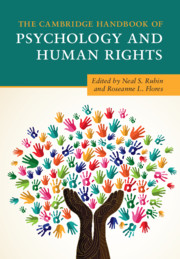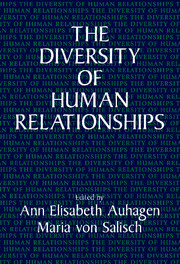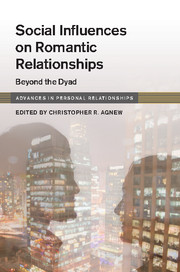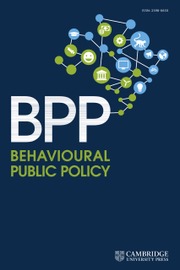The Cambridge Handbook of Psychology and Human Rights
Written by psychologists, historians, and lawyers, this handbook demonstrates the central role psychological science plays in addressing some of the world's most pressing problems. Over 100 experts from around the world work together to supply an integrated history of human rights and psychological science using a rights and strengths-based perspective. It highlights what psychologists have done to promote human rights and what continues to be done at the United Nations. With emerging visions for the future uses of psychological theory, education, evidence-based research, and best practices, the chapters offer advice on how to advance the 2030 Global Agenda on Sustainable Development. Challenging the view that human rights are best understood through a political lens, this scholarly collection of essays shows how psychological science may hold the key to nurturing humanitarian values and respect for human dignity.
- Describes the significant developments of psychology in advancing human rights at the United Nations
- Includes key historical figures in psychology and human rights
- Explains human rights instruments to shed light on the human rights system
- Links psychological science with understanding the behavioral dimensions of human rights challenges
- Shows how to translate psychological science into an optimistic endeavor to address emerging global issues
Awards
Finalist, 2021 PROSE Award - Single and Multivolume Reference, & Textbooks in the Social Sciences, Association of American Publishers
Reviews & endorsements
'This remarkable handbook draws upon a multi-disciplinary group of thought leaders who provide a compelling vision for addressing the manifestations of inequality. The coverage is broad, deep, and should be read by anyone concerned with promoting human rights and progress on the global agenda.' John C. Scott, Chief Operating Officer, APTMetrics, Inc.
'Wherever human rights are disregarded, psychology - as a science, professional practice, and perspective on life - is also questioned. This handbook is an impressive reminder to students, professionals, and researchers to respect human rights as a compass for their work, the importance of protecting them, and to promote them where possible.' Christoph Steinebach, Director of the School of Applied Psychology and Director of the Institute for Applied Psychology, Zurich University of Applied Sciences, Switzerland
'This soon-to-be-classic work has been ever-so-finely crafted to serve as a highly-referenced volume for many years to come in human rights, social justice, and the role that psychology can play. It is founded upon the powerful writing of a who’s who of contributing authors - I have never seen such a line-up of all-star academics, researchers, and most importantly: activists.' Chris E. Stout, Founding Director, Center for Global Initiatives
'The lack of adequate implementation of international human rights agreements is one of biggest scandals of our time. Looking at human rights through the lens of psychology presents interesting and feasible ways to correct this situation. This book is a must-read for every social scientist and human rights scholar!' Shekhar Saxena, Professor of the Practice of Global Mental Health, Harvard T. H. Chan School of Public Health, USA
'By thoughtfully framing psychology within a human rights context, this handbook outlines the dangerous propensity towards fundamentalism, bigotry, and fake news, which radicalises the susceptible or makes them indifferent to the issues affecting us all. Such an application of ethical psychology can, indeed must, improve human society.' Saths Cooper, Past President, International Union of Psychological Science, and Extraordinary Professor, University of Pretoria, South Africa
Product details
November 2020Paperback
9781108442817
658 pages
244 × 169 × 34 mm
1.12kg
Available
Table of Contents
- Part I. History of human rights:
- 1. How fear and hope shaped the universal declaration of human rights
- 2. Human rights developments from the universal declaration to the present
- 3. Connecting human rights and psychological ethics in a globalizing world
- 4. A historical narrative of psychology engaging human rights within the framework of the united nations
- Part II. The intersection of psychology and human rights:
- 5. The intersection of psychology and human rights in addressing racism, discrimination and xenophobia
- 6. Poverty and human rights for children and youth through the lenses of psychology and sociology
- 7. Labor rights as human rights: the role of OECD's responsible business conduct guidelines
- 8. Who's culture? challenging the idea of an opposition between women's human rights and the right to culture
- 9. Human rights: a psychologist's path to “do no harm”
- 10. Child rights: why they matter and how to realize them
- 11. Human rights of persons with disabilities: convention on the rights of persons with disabilities and its nexus with mental health and psychosocial well-being
- Part III. Contemporary issues, psychology and human rights:
- 12. Mental health and human rights
- 13. Cultivating our common humanity: reflections on freedom of thought, conscience, and religion
- 14. From refugees to immigrants: the role of psychology in the struggle for human rights
- 15. UN convention on the rights of the child and the sustainable development goals: implications for schools and educators
- 16. The global contributions of psychology to understanding and addressing the non-negotiability of human dignity and health equity
- 17. Human rights and psychology from indigenous perspectives
- 18. Human trafficking: vulnerabilities, human rights violations, and psychological consequences
- 19. Human rights seen through a cultural lens: Africa and Asia
- 20. Human rights and well-being of older persons
- 21. Reproductive justice, psychology, and human rights
- 22. Psychology and the global human rights agenda on sexual orientation and gender identity
- 23. Psychosocial features of movements that have advanced human rights
- 24. Principles of care of survivors of organized violence in a global society
- 25. Mental health and psychosocial support humanitarian settings: protecting and promoting human rights
- 26. Children and violence across the lifespan: a global and socioecological perspective
- 27. Psychology and human rights in the age of genomics and neuroscience
- 28. Behavioral insights, public policy and human rights
- 29. From human resources to human rights: tools for humanitarian work psychology
- 30. Climate change: a challenge to human rights, justice, equality, and human well-being
- Part IV. Teaching, research, and training in psychology and human rights:
- 31. Liberation psychology and human rights
- 32. Education of psychologists for human rights awareness, accountability and action
- 33. Conducting psychology across borders: maintaining scientific rigor and safeguarding human rights
- 34. Diversity in psychology education & training: a human rights imperative for a global inclusive psychology
- 35. Preparing future generations: critical considerations and best practices in training psychologists about the human rights of sexually and gender-diverse people and communities
- Part V. Future directions:
- 36. Human rights and reconciliation: theoretical and empirical connections
- 37. The Australian psychological society's apology to aboriginal and Torres Strait islander people: going beyond the apology in the teaching and training of psychologists
- 38. The role of scientific societies in promoting and protecting human rights and the example of the American psychological association
- 39. Human rights, psychology, and artificial intelligence
- 40. Psychology, human rights, and the implementation of the UN 2030 agenda for sustainable development.








